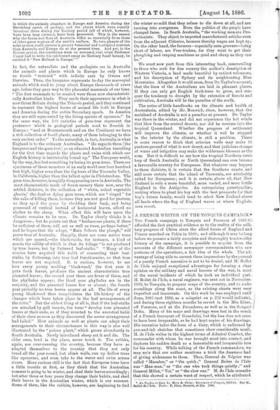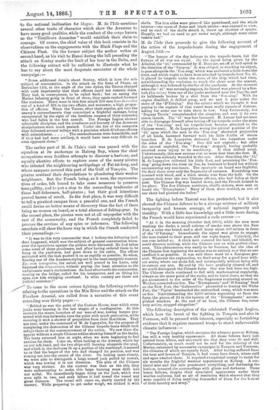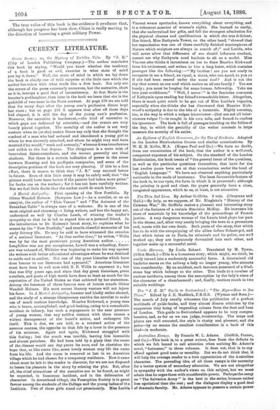A FRENCH WRITER ON THE TONQUIN CAMPAIGN. 10 THE French campaign
in Tonquin and Formosa of 1883 8,70. afforded the first practical evidence as to the reality of the mili- tary progress of China since the allied forces of England and France marched on Pekin in 1860 ; and although it may be long before we possess a fairly complete and thoroughly trustworthy history of the campaign, it is possible to acquire from the- accounts of the different newspaper correspondents who saw portions of the operations, a fair idea of the whole. The ad- vantage of being able to correct these impressions by the perusal, of a purely French narrative is not to be denied, and M. Rollet de l'Isle enjoyed exceptional advantages for forming a clear opinion on the military and naval lessons of the war, in most of the naval incidents of which he took an individual part. M. Rollet de l'Isle, a naval engineer, was sent out in November, 1883, to Tonquin, to prepare maps of the country, and to make- soundings along the coast, as the existing charts were very imperfect and inaccurate. On this work he was employed until June, 1885 (not 1886, as a misprint on p. 252 would indicate), and during these eighteen months he served in the Min River,. off Formosa, and at the Pescadores, as well as in the Songcoi Delta. Many of his maps and drawings were lost in the wreck of a French transport off Guardafui, but the loss does not seem to have been irreparable, as be had kept copies of his drawings. His narrative takes the form of a diary, which is enlivened by pen-and-ink sketches that sometimes show considerable merit_ M. de l'Isle writes in the highest terms of. Admiral Courbet, the- commander with whom he was brought most into contact, and deplores his sudden death as a lamentable and irreparable loss for his country. While talking of the French commanders, we- may note that our author mentions a trick the Anamese had of giving nicknames to them. Thus, General de Negrier was called " Maoulen," or " the quick ;" General Briere de l'Isle was "Man-man." or "the one who took things quietly ;" and General Minot," Toi," or "the slow one." M. de l'Isle remarks, that this showed a certain want of respect, which he attributed • An Tonkin ct dons Ifs Mere de Chine: Souvenirs Pt Croquis, 1E83-85. Par M.- Bullet de l'Isle. Paris: E. Pion, Nourrit, et Cie. 1886. to the national inclination for Unite. M. de l'Isle mentions several other traits of character which show the Anamese to have many good qualities, while the conduct of the corps known as the " Tiraillenrs Anamites " would establish their claim to courage. Of course, the chief value of this book consists in its observations on the engagements with the Black Flags and the Chinese Fleet. On the former subject the author writes at second-hand, as his visit to Hanoi during the lull preceding the attack on Sontay marks the limit of his tour in the Delta, and the following extract will be sufficient to illustrate what be eras to say about the most desperate encounter of the whole campaign :- " Some additional details about Sontay, which is here the sole subject of conversation. In the attack on the forts of Phase, on December 14th, at the angle of the two dykes, the Tames charged with such impetuosity that their officers could not restrain them. They had, in consequence, to be called back; but on seeing the Marine Infantry going in front of them, they again rushed forward like madmen. There were in this first attack 250 men hors de combat out of a total of 358 in the two affairs, and moreover, a high propor- tion of officers. When the Torsos, after their repulse, got into the enemy's entrenchments they committed a frightful carnage, being exasperated by the sight of the headless corpses of their comrades who had fallen in the first assault. The Foreign Legion showed admirable discipline, and the steadiness and bravery of the Anamese sharpshooters were much praised. Under the fire of the ramparts they delivered several volleys with a precision which filled our officers
with astonishment The entrenchments were formidable, and if thy bad had more artillery, it would have been very difficult to even approach them."
The earlier part of M. de l'Isle's visit was passed with the squadron at its anchorage in Halong Bay, where the chief -occupations were fruitless attempts to discover a harbour, and equally abortive efforts to capture some of the many pirates 'who infested the neighbouring archipelago of Fai-tsi-long, and whose sampans covered this part of the Gulf of Tonquin. The pirates confined their depredations to plundering their weaker neighbours. But the French being, as it were, the representa- tives of order, felt bound to take some measures to preserve tranquillity, and to put a stop to the marauding tendencies of these half-fishermen, half-pirates ; but their good intentions proved barren of result. In the first place, it was very difficult
to tell a piratical sampan from a peaceful one, and the French could devise no better means of discovery than the fact of there being no women on board, or a total absence of fishing-gear. In the second place, the pirates were not at all unpopular with the rest of the community, and the French completely failed to procure the services of any spies or informers. The following anecdote will show the loose way in which the French conducted their proceedings :-
" It was to this very commander that I believe the following inci- dent happened, which was the subject of general conversation when- ever the operations against the pirates were discussed. He had taken some score of these gentlemen, and after baying ordered them to be Lung at the yard-arm, had gone down to his cabin. The officer entrusted with the task pushed it on as rapidly as possible. So when, bearing one of the Anamese crying out in the most energetic manner, Ego sum interpretus, the sailor, not well posted in his Latin, only hastened the denouement, without paying the least attention to the unfortunate man's exclamations. An hour afterwards the commander, coming on the bridge, called for his interpreter, and on lifting his eyes, saw him swinging overhead. In what country are there not judicial mistakes ?"
To come to the more serious fighting, the following extracts relating to the operations in the Min River and the attack on the
Foochow Arsenal, are culled from a narrative of this event extending over thirty pages :—
" Behind us was the point of the Custom House, near which some junks were burning in the last stages of a conflagration. At this moment the steam launches of our men-of-war, towing barges pro- tected with iron bulwarks, turn the point with much precaution, while covering it with a shower of projectiles from their Hotchkiss. They are sent, under the command of M. de Lapeyrere, for the purpose of completing the destruction of the Chinese torpedo-boats which took refuge there at the commencement of the action. We saw them dis- appear without a single Chinese soldier showing himself on the banks. The boats returned late at night, when we were beginning to feel anxious for them. Later on, when looking at the Arsenal, which lay on our left hand, and the two ships still burning alongside the quay, and which in the darkness lit up a portion of the roadstead, it seemed to us that the larger of the two had changed its position, and was -coming out into the centre of the river. On looking more closely, we were able to distinguish a large armed junk pulled by rowers, which was towing it in our direction. The plan of the Chinese was very obvious. As the current was then on the ebb, they were endeavouring to make this large burning mass drift into our midst. We immediately began firing on the junk, which was BIM split in two, and sank before it had towed the vessel any
great distance. The vessel still came on, slowly carried by the current. While preparing to get under weigh, we riddled it with shells. The iron sides were pierced like pasteboard, and the whole interior—one mass of flame and black smoke—was exposed to view, and as each of the shells struck it, threw up showers of sparks. Happily, we had no need to get under weigh, although some other vessels had."
M. de l'Isle then proceeds to give the following account of the action of the torpedo-boats during the engagement of August 24th :-
" The honour of the day belongs to the torpedo-boats, but the fortune of all was not equal. On the signal being given by the Admiral, the '46,' commanded by M. Dona Ens, set off at half-speed in the direction of the Yang-on.' It was obliged, in reaching its object, to pass alongside the Fou-sing,' which was anchored a little down the river, and which ought to have been attacked by torpedo-boat No. 45. It placed its torpedo under the stern of the ship, which had time, notwithstanding the explosion, to reach the shore near the arsenal, although it was followed by the fire of the gunboats. At the moment when the 46' was reversing engines, its funnel was pierced by a fire. look (bis cafe's) from one of the junks anchored near the Pagoda, and its bulkheads broken by a shot from the 'Fou-sing.' With its engine disabled, it drifted away, and we saw it pass under the stern of the 'D'Estaing.' But the salutes which we thought it was paying to the captain of that vessel were really signals of distress, asking for some one to take them in tow. Very fortunately, the Dugnay Trouin ' comprehended the situation, and sent it its own steam launch. The 45 was less favoured. M. Latour had not been able to disengage himself after letting off his torpedo under the stern of the ' Fou-sing,' and his torpedo-boat became attached to the Chinese vessel. M. de Lapeyrere, seeing the critical position of the 45,' upon which the men in the Fou-sing' showered projectiles of all kinds, hastened forward with his little flotilla of steam launches. M. de Lapeyrere delivered his two torpedoes under the sides of the Fon-sing.' One did not explode ; but after the second exploded, the ' Fou-sing ' stopped, having probably
received some injury to its machinery. It then drifted away. Unfortunately, this new success cost us more dear than the first. M. Latour was seriously wounded in the eye. After detaching the ' 45,' M. de Lapeyrere collected his little fleet, and perceiving the noo- sing' going down the river on fire, he hastened to board her without encountering any resistance. The spectacle on board was frightful. On deck there were only the fragments of carcases. Everything was covered with blood, and a thick smoke rose from the hold. On the quarter-deck were the two Chinese officers, who had fallen at their post. The Chinese flag was hauled down, and the French hoisted in its place. The few Chinese survivors, chiefly stokers, were sent on board the ' Triomphante: Many of them were scalded, as one of our shots had pierced the boiler."
The fighting before Tamsui was less protracted, but it also showed the Chinese defence to be a strange mixture of military incapacity and human courage, of national ingenuity and timidity. With a little less knowledge and a little more daring, the French would have experienced a rude reverse :—
" At 6 in the morning (October 2nd, 1884), while the men were washing the decks, a small column of smoke rose above the New Fort, a noise was heard, and a shell burst about 400 metres in front of the D'Estaing.' Immediately the signal was given to engage, the men rushed to their guns, and our reply began. Unluckily, the sun rose behind 113. A thick mist covered the land, and blinded, wo could discover nothing, while the Chinese saw us with perfect clear- ness. This phenomenon was easily to be foreseen, but the idea of the Chinese first beginning the action was so entirely now that no one credited it as possible. It was said there must be a European pre- sent. Whatever the explanation, we fired away for a good hour with- out seeing where our shots fell, and consequently without being able to correct our aim. By-and-by the haze gradually cleared off, and we could distinguish the Chinese forts. Our aim had been too high. The Chinese shells continued to fall with mathematical regularity, always on the same point of the rocks, and to burst there, so that we got accustomed to the noise of the fragments scattering around us. We then corrected our fire. The Triomphante ' and D'Estaing' fired on the New Fort, the Galissoniere ' proceeded to destroy the White Fort, the Vipere' bombarded the entrenched camp, which was soon on fire. Notwithstanding the 3,000 metres separating us from the forts, the pieces of 21 in the turrets of the Triorophante ' accom- plished wonders. At the end of an hour, the Chinese fire, never very active, stopped altogether."
The following description of the celebrated Foreign Legion, which bore the brunt of the fighting in Tonquin and also in Formosa, will be perused with interest, especially as furnishing evidence that it requires seasoned troops to stand unfavourable climatic influences :—
" The Foreign Legion, which occupies the advance posts at Kelung, has still a very healthy appearance. All these fellows have just arrived from Africa, and one could see that they were fit and well. Unfortunately, as niuch could not be said for the infantry of the Marine, exhausted by successive campaigns in Tonquin and Formosa, the climates of which are equally fatal. After having suffered from the heat and fevers of Tonquin, it had come here direct, where cold and ague awaited them. It required exceptional energy to resist for six months the frightful weather experienced at Kelung. A con. tinnal mist and fine rain penetrated everything, and darkening the horizon, invested the surroundings with gloom and darkness. These brave fellows, despite their emaciated appearance under their woollen uniforms, had an air of resolution which sho wed that they were capable of doing anything demandel of them for the honour of their country and army.'
The true valve of this book is the evidence it produces that, although her progress has been slow, China is really moving in the direction of becoming a great military Power.




































 Previous page
Previous page